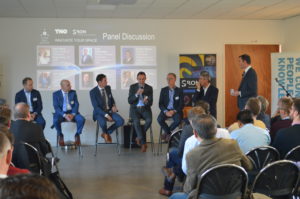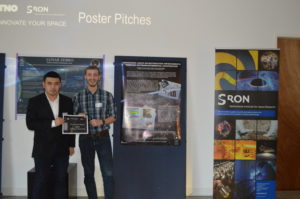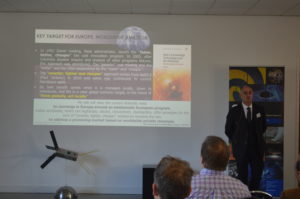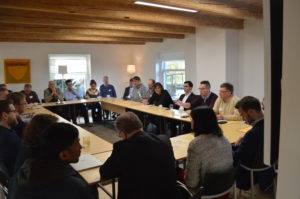The symposium started with a welcome by the hosts of the symposium, Eberhard Gill from the TU Delft Space Institute, Kees Buijsrogge from TNO and Annemieke Beers from SRON. In the first keynote speech, Egbert-Jan van der Veen, Head of Technology at OHB System in Germany, elaborated on key trends, market changes and challenges affecting the space sector. His inspiring talk was followed by a panel discussion. Henri Werij (TU Delft), Harm van de Wetering (NSO), Franco Ongaro (ESA-ESTEC), Arnaud de Jong (Airbus), Kees Buijsrogge (TNO) and Avri Selig (SRON) were challenged by several statements, such as the opportunities to work together in a smarter way, the vision the Dutch space industry focusses on and many other topics.

During lunch, a poster presentation was organized to show and discuss selected aspects of research at TU Delft, TNO and SRON. Furthermore for TU Delft, there was a competition between the eight PhD and master students from several faculties involved in the TU Delft Space Institute. Topics ranged from Deployable Telescopes to the Moon Rover and Vaporizing Liquid Microthruster improvements.
Not only did the students explain their research on the basis of their poster, the top three posters also prepared a three minutes pitch on their research. The winners of the competition, Chaggai Ganani and Alisher Kurmanbay, were awarded a financial contribution for attending a European conference for their outstanding work on micro-propulsion.

In the second part of the programme, the attendees got the opportunity to listen to Marc Valès, Space Programs Vice-President at Dassault Aviation in Paris, France. His keynote was devoted to identifying the risks for humanity and the role that Europe could play in mitigating those risks. The key takeaway was not only to work smarter, lighter and cheaper but to take one step forward to think globally and act locally.

Thereafter, the participants got the chance to get interactive and to participate in one of the following three Workshops:
- PIPPS (Partnerships for Space Instruments & Applications Preparatory Programme)
- Smarter, lighter, cheaper spacecraft technology
- Space photonics.

As Dutch tradition states, at the end of the symposium there were drinks which offered even more opportunities for networking. The TU Delft Space Institute is planning to take the lead in organizing a succession of the success of this symposium in 2019, co-organizers welcome.